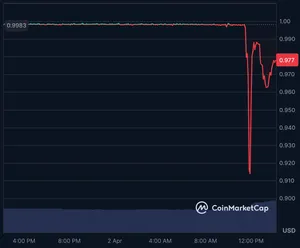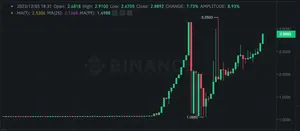The rumor has been amplified by Tron founder Justin Sun, who tweeted: "First Digital Trust (FDT) is effectively insolvent and unable to fulfill client fund redemptions. I strongly recommend that users take immediate action to secure their assets." First Digital responded by insisting they were solvent, and denounced Sun's comments as "a typical Justin Sun smear campaign to try to attack a competitor to his business".
FDUSD depegs
Almost $50 million stolen from Infini "stablecoin neobank"
Infini experienced a different form of "financial freedom" when attackers liberated almost $50 million from the company after a thief with access to a wallet with admin rights drained tokens, then swapped them for the DAI stablecoin, which unlike USDC cannot be frozen by its issuer.
The attack came only a day after a celebratory tweet from the company in which it had announced that they had achieved $50 million in total value locked, suggesting that the theft affected substantially all of the assets on the platform. Despite this, they have claimed that transactions on the platform are unaffected, and when someone asked how that was possible, they simply replied: "We've got solid runway to operate. No worries."
Infini attempted to contact the thief via on-chain message, threatening that they had "gathered critical IP and device information" about them, and asking them to return 80% of the funds in exchange for a promise that Infini "will cease further tracking or analysis, and you will not face accountability". However, Infini's 48-hour deadline has come and gone without any reply.
- "0xInfini Incident Analysis", CertiK
- Tweet by Infini [archive]
- Messages from Infini to the exploiter
Crypto scam money launderers charged for laundering more than $73 million through Deltec
Deltec is a well-known bank in the cryptocurrency world, mostly for its ties to Tether and to FTX. In July 2023, US authorities seized tens of millions from Deltec accounts in connection to a cryptocurrency money laundering investigation. It's not clear if that was the same investigation.
Someone accidentally burns $1.36 million Tether
Most experienced crypto users have adopted the habit of sending small test transactions before transferring large amounts of tokens, to first check that they're using the correct address. Oddly, this person did so in this case, but then went right ahead and transferred the remaining tokens to the erroneous address.
The person may have lucked out that they were using a centralized stablecoin like Tether, whose operators hold a substantial amount of control over freezing, destroying, and creating new Tethers — and could feasibly replace the burned tokens.
Abracadabra exploited for almost $6.5 million, Magic Internet Money stablecoin depegs
The Magic Internet Money ($MIM) stablecoin has lost its dollar peg again, dipping all the way below $0.77 in a flash crash before returning to around $0.95.
The depeg appears to be related to an exploit of the Abracadabra lending protocol, which allows people to borrow $MIM. An attacker exploited an apparent flaw in the platform's smart contracts to drain around $6.5 million.
This is the second time the token has depegged, after a June 2022 incident shortly after the Terra collapse.
TrueUSD loses peg (again) as traders sell due to fears over its stability
Adding to those is the fact that TrueUSD recently paused its real-time reserves attestations, due to systems reporting liabilities that exceeded assets, though TrueUSD (obviously) claimed this was just an error.
Tether mints itself a $1 billion Christmas present
On December 25, Tether minted 1 billion of its USDT dollar-pegged stablecoin. CEO Paolo Ardoino announced on Twitter that the mint was an "authorized but not issued transaction, meaning that this amount will be used as inventory for next period issuance requests and chain swaps". This seems to be a recent trend for Tether, as similar language was used for a $1 billion mint in September.
The activity has raised more questions around where the real money backing Tether is coming from, and if it even exists at all. Some have argued that these recent Tether mints are being used to artificially inflate the price of Bitcoin, which has been on an upward trend since mid-October.
Tether, which boasts a market cap of more than $90 billion, has never been audited, and has lied about its backing in the past.
The AEUR stablecoin isn't
Binance announced a compensation plan for users who purchased the token during an eligibility period and who were unable to resell, in an apparent attempt to placate the angry traders who accused Binance of "scamming" them by halting trading.
AEUR was issued by Anchored Coins, a Swiss stablecoin issuer.
DOJ cracks down on $225 million crypto romance scam
According to Tether, they "voluntarily fr[oze] approximately 225 million in USDT tokens" in connection to the investigation.
Some romance scammers hoping to lure victims into sending them cryptocurrencies are themselves victims of human trafficking operations, where they are held victim and forced to send such messages.
Raft exploited for $3.3 million, then hacker screws up
The attacker then went to convert the R into ETH, which they would then be able to launder and cash out. However, an error in the attacker's code caused 1,570 ETH ($3.25 million) to be sent to the burn address, rendering it permanently inaccessible to everyone including the hacker. Only 7 ETH remained. However, because they had to spend ETH to fund the attack, the hack ultimately resulted in a loss of 4 ETH (~$8,000) for the perpetrator. Oops.
As a result of the hack, the R stablecoin lost its dollar peg, plummeting down to around $0.70. Raft acknowledged the attack and announced that they had paused minting.








